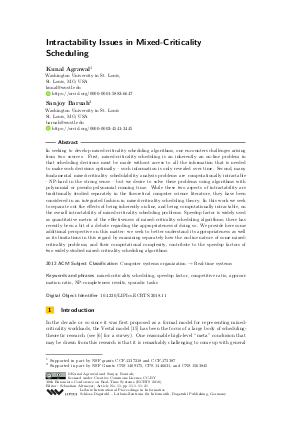Intractability Issues in Mixed-Criticality Scheduling
Authors
Kunal Agrawal  ,
Sanjoy Baruah
,
Sanjoy Baruah 
-
Part of:
Volume:
30th Euromicro Conference on Real-Time Systems (ECRTS 2018)
Part of: Series: Leibniz International Proceedings in Informatics (LIPIcs)
Part of: Conference: Euromicro Conference on Real-Time Systems (ECRTS) - License:
 Creative Commons Attribution 3.0 Unported license
Creative Commons Attribution 3.0 Unported license
- Publication Date: 2018-06-22
File

PDF
LIPIcs.ECRTS.2018.11.pdf
- Filesize: 0.61 MB
- 21 pages
Document Identifiers
Subject Classification
ACM Subject Classification
- Computer systems organization → Real-time systems
Keywords
- mixed-criticality scheduling
- speedup factor
- competitive ratio
- approximation ratio
- NP-completeness results
- sporadic tasks
Metrics
- Access Statistics
-
Total Accesses (updated on a weekly basis)
0PDF Downloads0Metadata Views
Abstract
In seeking to develop mixed-criticality scheduling algorithms, one encounters challenges arising from two sources. First, mixed-criticality scheduling is an inherently an on-line problem in that scheduling decisions must be made without access to all the information that is needed to make such decisions optimally - such information is only revealed over time. Second, many fundamental mixed-criticality schedulability analysis problems are computationally intractable - NP-hard in the strong sense - but we desire to solve these problems using algorithms with polynomial or pseudo-polynomial running time. While these two aspects of intractability are traditionally studied separately in the theoretical computer science literature, they have been considered in an integrated fashion in mixed-criticality scheduling theory. In this work we seek to separate out the effects of being inherently on-line, and being computationally intractable, on the overall intractability of mixed-criticality scheduling problems. Speedup factor is widely used as quantitative metric of the effectiveness of mixed-criticality scheduling algorithms; there has recently been a bit of a debate regarding the appropriateness of doing so. We provide here some additional perspective on this matter: we seek to better understand its appropriateness as well as its limitations in this regard by examining separately how the on-line nature of some mixed-criticality problems, and their computational complexity, contribute to the speedup factors of two widely-studied mixed-criticality scheduling algorithms.
Cite As Get BibTex
Kunal Agrawal and Sanjoy Baruah. Intractability Issues in Mixed-Criticality Scheduling. In 30th Euromicro Conference on Real-Time Systems (ECRTS 2018). Leibniz International Proceedings in Informatics (LIPIcs), Volume 106, pp. 11:1-11:21, Schloss Dagstuhl – Leibniz-Zentrum für Informatik (2018)
https://doi.org/10.4230/LIPIcs.ECRTS.2018.11
BibTex
@InProceedings{agrawal_et_al:LIPIcs.ECRTS.2018.11,
author = {Agrawal, Kunal and Baruah, Sanjoy},
title = {{Intractability Issues in Mixed-Criticality Scheduling}},
booktitle = {30th Euromicro Conference on Real-Time Systems (ECRTS 2018)},
pages = {11:1--11:21},
series = {Leibniz International Proceedings in Informatics (LIPIcs)},
ISBN = {978-3-95977-075-0},
ISSN = {1868-8969},
year = {2018},
volume = {106},
editor = {Altmeyer, Sebastian},
publisher = {Schloss Dagstuhl -- Leibniz-Zentrum f{\"u}r Informatik},
address = {Dagstuhl, Germany},
URL = {https://drops.dagstuhl.de/entities/document/10.4230/LIPIcs.ECRTS.2018.11},
URN = {urn:nbn:de:0030-drops-89925},
doi = {10.4230/LIPIcs.ECRTS.2018.11},
annote = {Keywords: mixed-criticality scheduling, speedup factor, competitive ratio, approximation ratio, NP-completeness results, sporadic tasks}
}
Author Details
Funding
- Agrawal, Kunal: Supported in part by NSF grants CCF-1337218 and CCF-173387
- Baruah, Sanjoy: Supported in part by NSF Grants CNS 1409175, CPS 1446631, and CNS 1563845
References
-
N. C. Audsley. Optimal priority assignment and feasibility of static priority tasks with arbitrary start times. Technical report, The University of York, England, 1991.

-
N. C. Audsley. Flexible Scheduling in Hard-Real-Time Systems. PhD thesis, Department of Computer Science, University of York, 1993.

-
S. Baruah, V. Bonifaci, G. D'Angelo, H. Li, A. Marchetti-Spaccamela, S. van der Ster, and L. Stougie. The preemptive uniprocessor scheduling of mixed-criticality implicit-deadline sporadic task systems. In Proceedings of the 2012 24th Euromicro Conference on Real-Time Systems, ECRTS '12, Pisa (Italy), 2012. IEEE Computer Society.

-
Sanjoy Baruah, Haohan Li, and Leen Stougie. Towards the design of certifiable mixed-criticality systems. In Proceedings of the IEEE Real-Time Technology and Applications Symposium (RTAS). IEEE, April 2010.

-
Sanjoy K. Baruah, Vincenzo Bonifaci, Gianlorenzo D'Angelo, Haohan Li, Alberto Marchetti-Spaccamela, Nicole Megow, and Leen Stougie. Scheduling real-time mixed-criticality jobs. IEEE Transactions on Computers, 61(8):1140-1152, 2012.

- Alan Burns and Robert I. Davis. A survey of research into mixed criticality systems. ACM Comput. Surv., 50(6):82:1-82:37, 2017. URL: http://dx.doi.org/10.1145/3131347.
- Jian-Jia Chen, Georg von der Brüggen, Wen-Hung Huang, and Robert I. Davis. On the Pitfalls of Resource Augmentation Factors and Utilization Bounds in Real-Time Scheduling. In Marko Bertogna, editor, 29th Euromicro Conference on Real-Time Systems (ECRTS 2017), volume 76 of Leibniz International Proceedings in Informatics (LIPIcs), pages 9:1-9:25, Dagstuhl, Germany, 2017. Schloss Dagstuhl-Leibniz-Zentrum fuer Informatik. URL: http://dx.doi.org/10.4230/LIPIcs.ECRTS.2017.9.
-
R. Graham. Bounds on multiprocessor timing anomalies. SIAM Journal on Applied Mathematics, 17:416-429, 1969.

-
Zhishan Guo. Real-Time Scheduling Of Mixed-Critical Workloads Upon Platforms With Uncertainties. PhD thesis, Department of Computer Science, The University of North Carolina at Chapel Hill, 2016.

-
Haohan Li. Scheduling Mixed-Criticality Real-Time Systems. PhD thesis, Department of Computer Science, The University of North Carolina at Chapel Hill, 2013.

-
C. Liu and J. Layland. Scheduling algorithms for multiprogramming in a hard real-time environment. Journal of the ACM, 20(1):46-61, 1973.

-
D. Sleator and R. Tarjan. Amortized efficiency of list update and paging rules. Communications of the ACM, 28:202-208, 1985.

-
Dario Socci, Petro Poplavko, Saddek Bensalem, and Marius Bozga. Mixed critical earliest deadline first. In Proceedings of the 2013 25th Euromicro Conference on Real-Time Systems, ECRTS '13, Paris (France), 2013. IEEE Computer Society Press.

-
J. Ullman. NP-complete scheduling problems. Journal of Computer and System Sciences, 10(3):384-393, 1975.

-
Steve Vestal. Preemptive scheduling of multi-criticality systems with varying degrees of execution time assurance. In Proceedings of the Real-Time Systems Symposium, pages 239-243, Tucson, AZ, December 2007. IEEE Computer Society Press.

